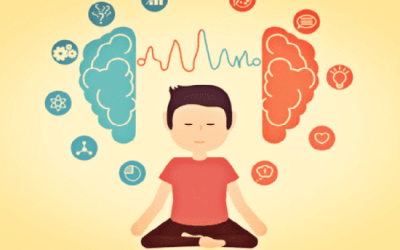Understand the powerful connection between mindfulness and overall health. Explore how mindfulness practices positively influence physical well-being, mental health, and overall vitality.
Table of Contents
The Mind-Body Connection: How Mindfulness Impacts Health
For centuries, Eastern traditions have emphasized the interconnectedness of mind and body. Now, Western science is catching up, revealing the profound impact of our mental state on physical health and vice versa. This article explores the mind-body connection and how mindfulness practices can be harnessed to improve overall well-being.
The Two-Way Street: How Mind Influences Body
Our thoughts and emotions have a tangible effect on our physiology. When we experience stress, for example, the body releases cortisol, a hormone that increases heart rate, blood pressure, and blood sugar levels. This fight-or-flight response, while helpful in acute situations, can wreak havoc on the body over time, contributing to chronic conditions like heart disease, diabetes, and even certain cancers.
Conversely, positive emotions like gratitude and joy can trigger the release of feel-good chemicals like endorphins and oxytocin, which have mood-boosting and immune-strengthening effects. This highlights the bidirectional nature of the mind-body connection: our mental state can influence our physical health, and vice versa.
Mindfulness: The Bridge Between Mind and Body
Mindfulness is the practice of paying non-judgmental attention to the present moment. It involves observing our thoughts and sensations without getting caught up in them. This simple yet powerful practice can be a game-changer for our health.
Here’s how mindfulness impacts health:
- Reduces stress: Mindfulness helps us become aware of our stress triggers and develop healthier coping mechanisms. By learning to observe our thoughts and emotions without judgment, we can avoid getting swept away by negativity and reactivity.
- Improves sleep: Mindfulness can quiet the mind and promote relaxation, leading to better sleep quality. This is crucial for overall health and well-being, as sleep deprivation can disrupt hormones, weaken the immune system, and contribute to a variety of health problems.
- Enhances focus and concentration: By training our attention to stay present in the moment, mindfulness can improve our ability to focus and concentrate. This can benefit us in all aspects of life, from work and study to relationships and personal hobbies.
- Boosts the immune system: Studies have shown that mindfulness can strengthen the immune system’s response to stress and illness. This is likely due to the reduction in stress hormones and the increased activity of white blood cells.
- Promotes emotional well-being: Mindfulness can help us develop greater self-awareness and compassion. By understanding our own thoughts and emotions, we can better manage them and cultivate a more positive outlook on life.
Mental Health:
- Emotional Regulation: Mindfulness cultivates increased self-awareness and understanding of our thoughts and emotions. This allows us to observe negativity, anxiety, or intrusive thoughts without getting caught up in them. This improved emotional regulation leads to less reactivity and a more stable, positive mood.
- Reduced Anxiety and Depression: Studies have shown that mindfulness-based interventions can effectively manage symptoms of anxiety and depression. By learning to detach from negative thought patterns and focus on the present moment, individuals can break free from the cycle of worry and rumination that fuels these conditions.
- Increased Attention and Focus: Mindfulness training strengthens our ability to concentrate and stay present in the moment. This enhanced focus benefits us in all aspects of life, from work and study to relationships and personal hobbies.
- Improved Self-Compassion: Mindfulness fosters a kinder and more accepting attitude towards ourselves, leading to increased self-compassion. This reduces self-criticism and judgment, allowing us to navigate challenges with greater resilience and emotional wellbeing.
Overall Vitality:
- Enhanced Energy Levels: By reducing stress and improving sleep quality, mindfulness practices increase energy levels and combat fatigue. This allows us to engage in activities with more enthusiasm and participate fully in life.
- Greater Motivation and Purpose: Mindfulness can help us connect with our values and identify what truly matters to us. This newfound sense of purpose can fuel motivation and inspire us to take action towards fulfilling goals and aspirations.
- Resilience and Adaptability: By strengthening our ability to manage stress and cultivate acceptance, mindfulness enhances our resilience in the face of challenges. This increased adaptability allows us to navigate life’s ups and downs with greater ease and maintain a sense of well-being even in difficult situations.
Getting Started with Mindfulness:
If you’re new to mindfulness, there are many resources available to help you get started. Here are a few tips:
- Start small: Begin with just a few minutes of mindfulness practice each day. There are many guided meditations and mindfulness exercises available online and in apps.
- Find a quiet place: Choose a quiet and comfortable place where you won’t be interrupted.
- Focus on your breath: Pay attention to the sensations of your breath as you inhale and exhale. This is a simple but effective way to anchor your attention in the present moment.
- Be patient: Mindfulness is a skill that takes time and practice to develop. Don’t get discouraged if you find your mind wandering at first. Just gently bring your attention back to the present moment.
Remember, mindfulness is not about achieving perfection; it’s about cultivating a more present and aware way of being. By incorporating mindfulness practices into your daily routine, you can reap the many benefits of a strong mind-body connection and experience a healthier and happier life.
Conclusion
In conclusion, mindfulness practices offer a wealth of benefits for physical well-being, mental health, and overall vitality. Through stress reduction, improved emotional regulation, and enhanced self-awareness, mindfulness empowers us to live healthier, happier, and more fulfilling lives. So, why not give it a try? You might be surprised at the positive impact it can have on your well-being.
I hope this article has given you a better understanding of the mind-body connection and how mindfulness can impact your health. If you have any questions, please feel free to leave a comment below.
By taking care of our minds, we can take care of our bodies, and vice versa. Let’s all make mindfulness a priority for a healthier and happier future.






